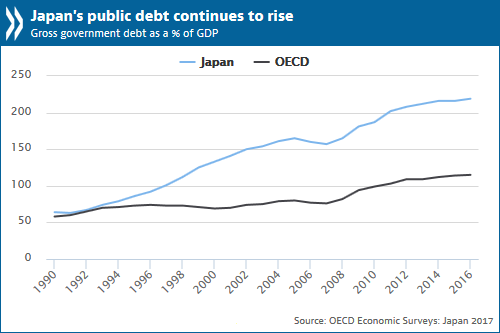Japan: Boost employment and productivity to promote inclusive growth and meet demographic challenges
The Japanese economy has gained momentum and is creating jobs, according to a new OECD report.

The latest OECD Economic Survey of Japan, presented in Tokyo byOECD Secretary-General Angel Gurría, says that per capita growth rates in recent years have matched those across the OECD – a major improvement. The Survey underlines the key role Abenomics has played in the economic revival.
But more needs to be done to solidify the expansion and ensure future economic prosperity and well-being against the backdrop of high government debt and a shrinking workforce. The report identifies priority areas for further reforms, including further efforts to increase labour force participation, create more “regular” jobs, especially for women, boost productivity and put public finances on a sustainable track.
“Abenomics has delivered faster economic growth and job creation,” Mr Gurría said. “However, meeting Japan’s demographic and fiscal challenges will require greater efforts and further reforms, notably to raise productivity, which now lags behind the leading OECD economies. In the labour market, employment opportunities for women must be expanded. Achieving stronger and sustainable productivity gains should lead to more inclusive growth that distributes the dividends of increased prosperity fairly across society. ”
Faced with labour market shortages linked to population ageing, it is important that Japan remove obstacles to female employment, notably by increasing the availability of affordable childcare and changing its culture of long working hours through a binding ceiling on overtime work which would improve work-life balance for all workers. This also bodes well with Prime Minister Shinzo Abe’s strong emphasis on promoting ‘womenomics’ and his recent efforts on ‘work style’ reforms.
Breaking down dualism in the labour market – the current segmentation between “regular” and “non-regular” workers, with differing levels of benefits, pay and employment protection - is key to promoting inclusive growth, the Survey said.
Continued increases in health and pension spending linked to population ageing will put upward pressure on government debt, which reached 219% of GDP in 2016, the highest ever recorded in the OECD. Ensuring long-term fiscal sustainability requires the implementation of a detailed and credible fiscal plan to put the debt ratio on a downward path. The Survey lays out recommendations for controlling public spending and raising additional revenues, notably by gradually raising the consumption tax and increasing environmental taxes.
The Survey emphasises that increasing productivity can simultaneously help Japan address demographic and fiscal challenges and make growth more inclusive. Reforms that narrow the wide productivity gaps between manufacturing and service sector firms and those between large companies and SMEs would help achieve these dual objectives. Priorities include improving the personal bankruptcy system to facilitate the exit of non-viable firms, promoting entrepreneurship and increasing Japan’s integration in the world economy, the Survey said.
Source: Organization for Economic Co-operation and Development
- 331 reads
Human Rights
Fostering a More Humane World: The 28th Eurasian Economic Summi

Conscience, Hope, and Action: Keys to Global Peace and Sustainability

Ringing FOWPAL’s Peace Bell for the World:Nobel Peace Prize Laureates’ Visions and Actions

Protecting the World’s Cultural Diversity for a Sustainable Future

Puppet Show I International Friendship Day 2020

